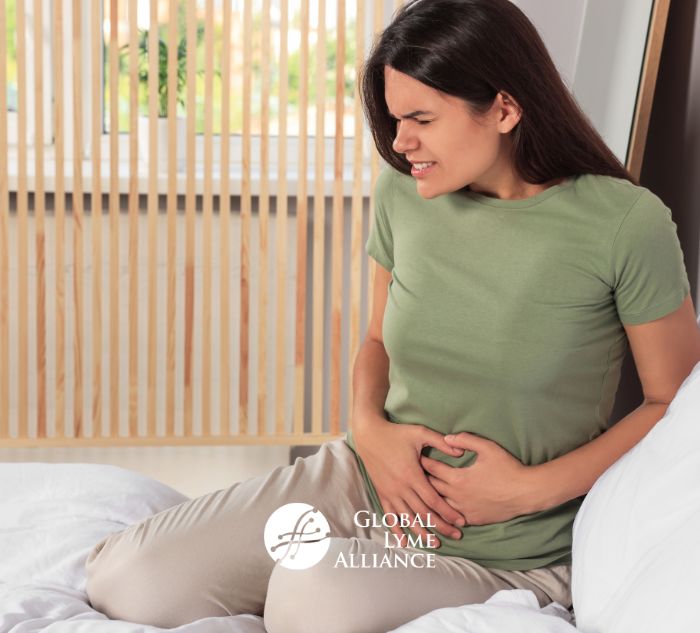
Learn how Lyme disease can impact bladder health and discover treatment options for symptoms like frequent urination and bladder pain. Understand the connection between Lyme disease and interstitial cystitis.
Lyme disease, transmitted by the bite of an infected black-legged tick, can present in many ways. While common early symptoms include fever, chills, fatigue, headache, stiff neck, swollen lymph nodes, and sometimes an erythema migrans (EM) rash, not everyone has the same symptoms. If Lyme disease isn’t treated early or effectively, the bacteria can spread to other areas of the body including the heart, joints, and nervous system. Some people get Lyme arthritis; some people have brain fog; still others have gastrointestinal issues. Lyme disease bacteria can work their way into every system of the body, even the bladder. Let’s walk through the ways Lyme disease can impact bladder health, and what you can do about it.
Lyme and Bladder Symptoms
Lyme bacteria and co-infections can hide in the bladder, contributing to interstitial cystitis (IC)-like symptoms. These include:
- Frequent urination
- Nighttime urination
- Bladder pain
- Incontinence
Interstitial cystitis, or bladder inflammation, may stem from a Lyme infection that’s been overlooked. In the Bustle article “Experts Say Lyme Disease Can Cause This Bladder Issue,” internist, epidemiologist, and Lyme expert Daniel Cameron, MD notes that many of his Lyme patients with bladder symptoms also tend to have gastrointestinal problems or postural orthostatic tachycardia syndrome (POTS). “It may be that all these issues are related to dysfunction of the autonomic nervous system,” he says.
Treating Lyme-Related Bladder Symptoms
As with many symptoms of Lyme disease, bladder symptoms tend to clear up when the Lyme infection itself is adequately treated. In the Bustle article, Dr. Cameron notes that his patients’ bladder symptoms usually go away after he treats the Lyme disease. Integrative health expert on Lyme and other chronic illness Bills Rawls, MD concurs that “he has seen patients with Lyme-related bladder issues get better.”
If you are experiencing bladder symptoms, it’s first important to rule out other bladder infection or problems. If your Lyme Literate Medical Doctor (LLMD) believes your bladder symptoms are Lyme-related, there are several different treatment options you can try. Dr. Rawls’ patients tend to improve with antimicrobial herbs. Other options include:
Conventional Treatments for IC
In his article “The Link Between Interstitial Cystitis and Lyme Disease,” Dr. Rawls discusses the following conventional treatments for IC:
- FDA-approved Pentosan polysulfate sodium (Elmiron), which may take a few months to work and can have side effects like hair loss, gastrointestinal issues, itching, or rash
- Tricyclic antidepressants such as amitriptyline, which help with bladder pain and relaxation
- Antihistamines can help with urinary frequency and urgency
- Uribel, which is a combination medication that has antimicrobial properties and can relax the bladder
- Detrol LA, an anticholinergic drug
The effectiveness of medication can vary from patient to patient, and what works for one person might not work for another. That’s why it’s so important to come up with a personalized treatment plan under the direction of your practitioner.
Strengthening the Immune System
If you are battling Lyme and other tick-borne disease, your immune system is working overtime and may be weakened by infection. Strengthening your immune system can help you fight tick-borne disease and related symptoms, including bladder symptoms. As Dr. Rawls notes in the Bustle article, “The goal is restoring normal immune function so the immune system can do its job to reach a suppression-free state.”
Talk to your LLMD about best ways to strengthen your own immune system, which may include vitamins or supplements, dietary changes, exercise, and proper rest.
Floor Time
TikTok’s trend of “floor time” has gained popularity as a stress-relief practice, likened to yoga’s savasana. Practicing floor time involves lying on the floor, prioritizing comfort, and focusing on relaxation for at least five minutes. Lying on the floor provides grounding physical and mental benefits including muscle tension release and stress reduction. Floor time is recommended after a stressful day or prolonged periods of sitting.
Conclusion
Lyme disease can manifest in many different ways, including as interstitial cystitis-like bladder symptoms. While these symptoms are uncomfortable, they can usually be cleared up with Lyme disease treatment. Other conventional treatments for IC, as well as techniques you can do at home, can help you find bladder symptom relief.
***





-2.jpg)


